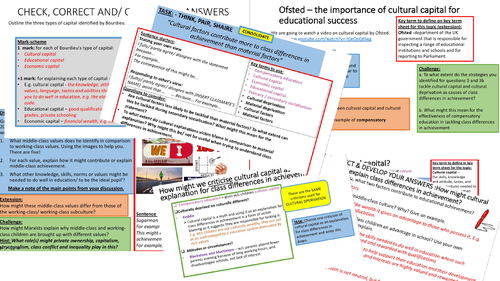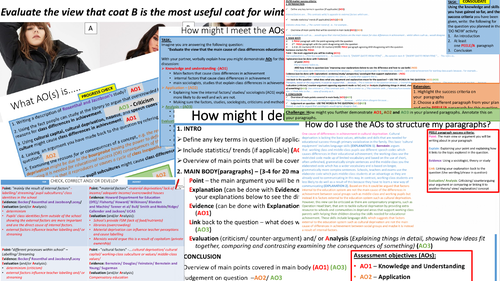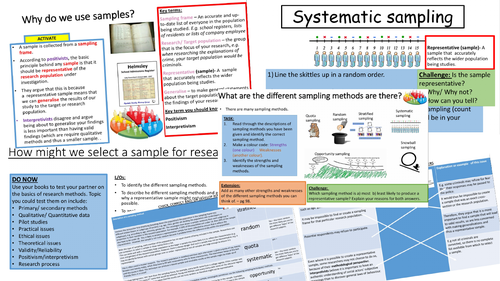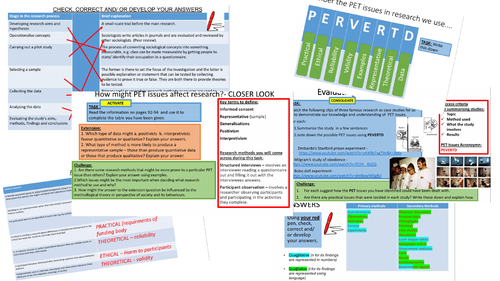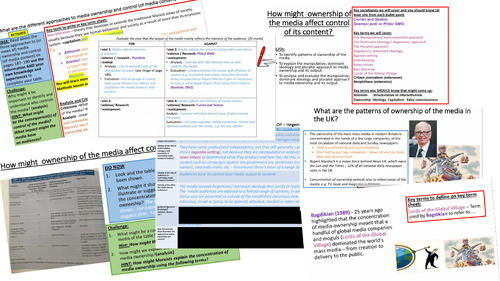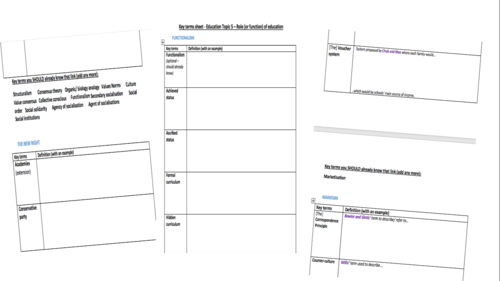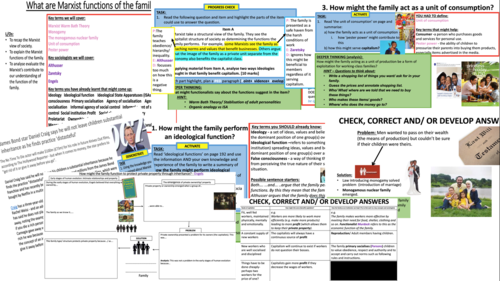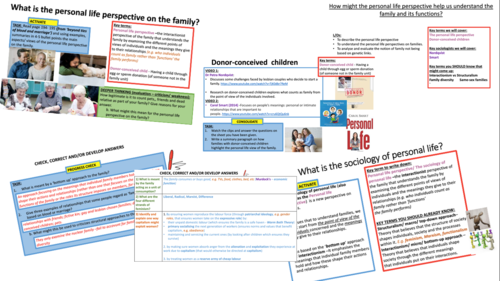
177Uploads
22k+Views
5k+Downloads
All resources

Sociology Education Class differences in achievement - Cultural capital
Detailed and differentiated (up and down), student led lesson that explores cultural, educational and economic capital and compensatory education to enable students to understand the role of cultural capital in causing class differences in achievement/ middle-class achievement. Also covers and supports students in answering 4/6 markers using a success criteria and student-friendly mark-schemes.
ANSWERS TO MAIN ACTIVITIES AND EXAM QUESTIONS ARE INCLUDED
COMES WITH FREE A-LEVEL HELP SHEET AND KEY TERM SHEET FOR TOPIC 1 & 2
**Made for AQA A-level but can be easily used for other specs (just need a different source of information/ textbook) differentiated down for GCSE) lesson **
Uses and refers to ’ AQA A Level Sociology Book One Including AS Level: Book one 3rd Revised edition by Rob Webb, Hal Westergaard, Keith Trobe, Annie Townend ’ textbook

Sociology Education Class differences in achievement- How to answer 30/ 20 markers?
Detailed and differentiated (up and down), student led lesson that explores:
the main assessement objectives - AO1, AO2, AO3
how to answer 30 markers
allows studeNts to revise class differences in achievement (external and internal factors).
**Can also be used as a revision lesson for topic 2 (class diff in achievement -internal factors) Includes student friendly success criteria for essay **
ANSWERS TO MAIN ACTIVITIES AND MODEL ANSWER INCLUDED
Made for AQA A-level but is applicable for AS-Level and can be used for ANY SPEC and is still paplicable for GCSE essays

SOCIOLOGY Research methods - Sampling methods
Detailed and differentiated student-led lesson that explores sampling methods, sampling frame, representative (sample), generalising (findings) and the relationship between these and positivism vss interpretivism and theoretical issues. LESSON COMES WITH ANSWERS
Catered for AQA A-level Sociology but can be used for ANY SPEC and GCSE without being edited.
Comes with key term sheet for the lesson.

Research methods - Practical, ethical and theoretical issues
Detailed and differentiated student-led lesson that explores practical (time, cost, research opportunity, requirements of funding body & subject matter), ethical (informed consent, confidentiality, harm to participants, vulnerable groups & covert research) and theoretical issues (validity, reliability, representativeness, methodological perspective).
Catered towards A-LEVEL AQA sociology but if main activity can be replaced, the rest can be used for GCSE and ANY SPEC.
Main activity uses pages 92-94 of the AQA A Level Sociology Book One Including AS Level: Book one 3rd Revised edition by Rob Webb, Hal Westergaard, Keith Trobe, Annie Townend
Comes with key term sheet for the lesson.

AQA A-Level Sociology Crime and Deviance PLC (EDITABLE)
Personal Learning Checklist for the Crime and Deviance unit in the AQA A-level Sociology syllabus.
Bundle

AQA A-level Sociology Education: Topic 5 The Role of education - Functionalist, Marxist and the New Right views
Includes: lessons on the functionalist, Marxist and the New Right view (see below for more detail) and key term sheet for the topic which can be set for home-learning or be filled out during the course of the lessons.
L1: Functionalist view of the role of education
Detailed student led lesson on functionalist views of the role of education adapted to stretch and challenge the most able whilst scaffolding to allow pupils who need support the opportunity to access higher level thinking.
Covers the following functionalist key functions of education: installing social solidarity, bridging the gap between the family and wider society through secondary socialisation, teaching specialist skills needed for work and role allocation.
Covers the following functionalist sociologists: Durkheim, Parsons and Davis and Moore.
Covers the following key term:
Function or role (e.g. of an institution)
Social solidarity
Formal curriculum
Hidden curriculum
Ascribed status
Achieved status
Universalistic standards
Particularistic standards
Meritocracy
Socialisation
Role allocation
Promotes a spiral curriculum by making links to key terms that students might have previously been taught that link to this lesson.
Promotes, facilitates and scaffolds Oracy.
Develops the skills needed to answer 10 markers with items - allows students to apply knowledge to an item 10 marker with guidance and includes a detailed success criteria to help them answer this.
Uses and refers to ’ AQA A Level Sociology Book One Including AS Level: Book one 3rd Revised edition by Rob Webb, Hal Westergaard, Keith Trobe, Annie Townend ’ textbook
DETAILED ANSWERS INCLUDED FOR MAIN ACTIVITIES
NOTES -RESOURCES CAN BE FOUND AT THE END OF THE PPT.
L2: Marxist view of the role of education
Detailed student led lesson on the Marxist views of the role of education adapted to stretch and challenge the most able whilst scaffolding to allow pupils who need support the opportunity to access higher level thinking.
Covers the following Marxist key functions of education: reproducing class ienquality, legitimising class inequality, correspondence principle,
Covers the following functionalist sociologists: Althusser, Bowles and Gintis and Willis
Covers the following key term:
State apparatuses
Ideological state apparatuses
Repressive state apparatuses
Ideology
Correspondence principle
Hierarchy
Alienation
Fragmentation
Extrinsic reward
Competition
Promotes a spiral curriculum by making links to key terms that students might have previously been taught within the education unit and for Marxism as a theory that link to this lesson.
Promotes, facilitates and scaffolds Oracy.
Provides guidance for answering 4 markers.
Uses and refers to ’ AQA A Level Sociology Book One Including AS Level: Book one 3rd Revised edition by Rob Webb, Hal Westergaard, Keith Trobe, Annie Townend ’ textbook
DETAILED ANSWERS INCLUDED FOR THE MAIN ACTIVITIES ON THE FUNCTIONS OF EDUCATION ONLY
NOTES -RESOURCES CAN BE FOUND AT THE END OF THE PPT.
L3: The New Right view of the role of education
Detailed student led lesson on the New Right critique and view of the purpose state education adapted to stretch and challenge the most able whilst scaffolding to allow pupils who need support the opportunity to access higher level thinking.
Covers the following key terms:
Neo-liberalism
The New Right
Conservatives
Voucher system
One-size-fits-all approach
League tables
Ofsted reports
National curriculum
Marketisation
Privatisation
Academies
Free schools
State schools
Social policies
Covers the following key sociologists: Chubb and Moe
Uses and refers to ’AQA A Level Sociology Book One Including AS Level: Book one 3rd Revised edition by Rob Webb, Hal Westergaard, Keith Trobe, Annie Townend ’ textbook
BRIEF ANSWERS TO THE MAIN ACTIVITY INCLUDED
NOTES -RESOURCES CAN BE FOUND AT THE END OF THE PPT.
Key term sheet for the role of education
Alphabetical key term sheet for AQA A-level Sociology Education Topic 5 Role of education that requires students to fill out the definitions themselves.
*** Includes some sentence starters to model to students how to incorporate key sociologists into their definitions. **
*** Key terms separated into Functionalist, New Right and Marxist key terms. **
*** Includes a section with key terms that students should know from previous learning (intro to sociological theories and topic 1-4 of education) that link to this topic. **
Good form of revision for students and can be used as a revision resource to develop AO1 once filled out.
**BASED ON CONTENT in textbook - AQA A Level Sociology Book One Including AS Level: Book one 3rd Revised edition by Rob Webb, Hal Westergaard, Keith Trobe, Annie Townend ’ textbook

Intro to GCSE Sociology
Lesson to introduce the AQA GCSE Sociology course (but can be easily edited to meet the needs of other specs) and to the sociological imagination or line of inquiry. The lesson includes:
an overview of the course, exam and curriculum
An activity on how to create and maintain a safe space for discussions
suggested revision websites and youtube channels that students can use to develop their knowledge and understanding of key ideas and concepts.
activities to introduce students to Sociology and sociological thinking/ inquiry.
Expectations
** Edited from A-level version to meet the needs of KS4 students. **

AQA GCSE Sociology - Research Methods - Ethnography
Detailed lesson with lots of scaffolding based on adaptive teaching that help students understand what ethnography is as a research method and its main features, explain the strengths and weaknesses of using ethnographic research to study sociological issues and topics.
Cover the following key terms:
Ethnography
Triangulation
Includes 4 marker with success criteria for answering it
Covers the following sociologists:
Mead
Whyte
Young and Wilmott
ANSWERS TO SOME ACTIVITIES INCLUDED
RESOURCES CAN BE FOUND AT THE END OF PPT

AQA A-Level Sociology Beliefs in Society PLC (EDITABLE)
Personal Learning Checklist for the Beliefs in Society unit in the AQA A-level Sociology syllabus. PLC includes topic and page numbers from the Westergaard and Townsend book one and two for content students my find hard to locate.

AQA A-level Sociology: Media Topic 1 - Ownership and control of output
Detailed and differentiated (up and down), student led lesson that allows students to examine patterns of media ownership and the three main approaches (manipulative, hegemonic and pluralist) to media ownership and control of media output. Also introduces studets to the difference between Marxism and Neo-Marxism and links to structural vs humanistic marxism and structural determinsm. Examines the following concepts to do this: Ideology, Hegemony, Agenda-setting, Gate-keeping, News values, Marxism Neo-Marxism, Lords of the Global Village.
ANSWERS TO MAIN ACTIVITIES INCLUDED**
RESOURCES FOR LESSON CAN BE FOUND AT THE END OF PTT
Made for AQA A-level but can be easily used for other specs (just need a different source of information/ textbook)
**REQUIRES textbook - 'SOCIOLOGY For AQA Volume 2 by Browne, Blundell & Law **

WRITING FRAME - AQA A-level Sociology: Families – Topic 3 Theories of the family 20 marker
Detailed writing frame that scaffolds (from introduction to conclusion) a full answer for a 20 marker on the family being beneficial (family -topic 3 theories of the family). Models how to use the item to select points or arguments to answer the question.
*** Based on AQA specification**
Supports students with planning the 20 marker (using the item) - using planning success criteria.
Outlines the success criteria and provides sentence starters for the full essay (intro, main body and conclusion). Success criteria used for paragraphs in main body of essay is PEELE/A
Outlines the key terms, sociologists, theories that can be used when answering the question.
Supports students who need support and guidance with writing essays whilst providing students who are already good at writing essays opportunities to further improve their essay skills.

Sociology Education Class differences in achievement (internal factors) - Class identities
Detailed and differentiated (up and down), student led lesson that explores pupil identity, class identities, habitus, symbolic capital, symbolic violence, nike identities, style performances to enable students to understand the role of class identities in causing class differences in achievement/ working-class underachievement/ middle-class achievement. Also covers and supports students in answering 4/6 markers using a success criteria and student-friendly mark-schemes.
ANSWERS TO MAIN ACTIVITIES AND EXAM QUESTIONS ARE INCLUDED
COMES WITH FREE A-LEVEL HELP SHEET AND KEY TERM SHEET FOR TOPIC 1 & 2
**Made for AQA A-level but can be easily used for other specs (just need a different source of information/ textbook) differentiated down for GCSE) lesson **
Uses and refers to ’ AQA A Level Sociology Book One Including AS Level: Book one 3rd Revised edition by Rob Webb, Hal Westergaard, Keith Trobe, Annie Townend ’ textbook
Bundle

AQA A-LEVEL Sociology Family Topic 2 Childhood - LESSONS, KEY TERM SHEET AND REVISION LESSON
LESSONS
L1 - Detailed and differentiated student-led lesson that explores childhood, social constructionism, industrialisation (briefly), the globalisation of western childhood , western notion of childhood as a way to introduce students to the idea of the social construction of childhood. Mostly focusses on cross-cultural differences in childhood but briefly covers historical differences of childhood in Britain. Explores the views of sociologists such as Pilcher, Benedict, Wagg, Punch, Holmes, Firth and Malinowski. AQA A-level Families Topic 2 Childhood- Lesson 1
L2 - Detailed and differentiated student-led lesson that explores Pre-industrial society, Industrialisation, Modern western notion of childhood, ‘cult of childhood’, Child-centredness/centred society , Infant mortality, as a way to examine Aries views and explanations of the historical differences in western childhood.
L3 - Detailed and differentiated student-led lesson that explores Information hierarchy , Postmodernity/ postmodern society/ contemporary society, Modernity/ modern society/ industrial society, Accordion family, Boomerang children as a way to examine the changes to the modern western notion of childhood in contemporary society. Covers the views of Postman and Jenks.
L4 - Detailed and differentiated student-led lesson that explores march of progress theory, Toxic childhood, Conflict theory, Age patriarchy, Child liberationism as a way to examine the different views (march of progress and conflict views) of whether childhood has improved over time. Includes views of Gittins, Palmer, Firestone and Holt, Aries etc.
KEY TERM SHEET
Alphabetical key term sheet for AQA A-level Sociology Family Topic 2 Childhood that requires students to fill out the definitions themselves. Includes some sentence starters for more difficult key terms.
**Good form of revision for students and can be used as a revision resource to develop AO1 once filled out. **
**BASED ON CONTENT in textbook - AQA A Level Sociology Book One Including AS Level: Book one 3rd Revised edition by Rob Webb, Hal Westergaard, Keith Trobe, Annie Townend ’ textbook
**REVISION LESSON **-
Detailed and differentiated (up and down) student led lesson that supports students in recapping the main theories, views and explanations of the position of childhood; examines how march of progress, conflict, child liberationists and postmodernist theories’ view society and how this might influence their approach or view of childhood and its changes over time. Also highlights the key sociologists (Katz, Postman, Aries, Palmer, Jenks, Gittens) in this topic.
The lesson then requires students to apply this knowledge to plan (using a success criteria) a 20 marker and write at least one paragraph for it.

AQA A-level Sociology Education Topic 5 Role of education - Functionalist view
Detailed student led lesson on functionalist views of the role of education adapted to stretch and challenge the most able whilst scaffolding to allow pupils who need support the opportunity to access higher level thinking.
Covers the following functionalist key functions of education: installing social solidarity, bridging the gap between the family and wider society through secondary socialisation, teaching specialist skills needed for work and role allocation.
Covers the following functionalist sociologists: Durkheim, Parsons and Davis and Moore.
Covers the following key term:
Function or role (e.g. of an institution)
Social solidarity
Formal curriculum
Hidden curriculum
Ascribed status
Achieved status
Universalistic standards
Particularistic standards
Meritocracy
Socialisation
Role allocation
Promotes a spiral curriculum by making links to key terms that students might have previously been taught that link to this lesson.
Promotes, facilitates and scaffolds Oracy.
Develops the skills needed to answer 10 markers with items - allows students to apply knowledge to an item 10 marker with guidance and includes a detailed success criteria to help them answer this.
Uses and refers to ’ AQA A Level Sociology Book One Including AS Level: Book one 3rd Revised edition by Rob Webb, Hal Westergaard, Keith Trobe, Annie Townend ’ textbook
DETAILED ANSWERS INCLUDED FOR MAIN ACTIVITIES
NOTES -RESOURCES CAN BE FOUND AT THE END OF THE PPT.

Introduction to feminism
Detailed and differentiated student-led lesson that explores sex, gender, gender roles, patriarchy, socialisation, gender inequality as a way to introduce students to the main feminist views of society and ideas. Can be used for ANY SPEC. Catered towards A-level students but can easily be simplified and/ or for younger students.
Bundle

GCSE AQA Sociology INTRO LESSONS & QUIZ
Detailed and differentiated (up and down) student-led lessons that help students to develop their knowledge and understanding from previous lesson(s). Includes 6 lessons (the last being a quiz lesson) and a key term sheet that covers the key terms in these lessons:
**L1 – Intro to GCSE AQA Sociology: **
an overview of the course, exam and curriculum
An activity on how to create and maintain a safe space for discussions
suggested revision websites and youtube channels that students can use to develop their knowledge and understanding of key ideas and concepts.
activities to introduce students to Sociology and sociological thinking/ inquiry.
Expectations
L2 – How might sociologists explain behavior?
Explores, norms, values, socialisation (primary/secondary) and social control, agencies and agents of socialisation and social control as an introduction to Sociology.
Also looks at the importance of primary socialisation and the consequences of it inadequately performed.
3 marker with a success criteria and student friendly mark-scheme
L3 – Intro to functionalism
Explores value consensus, social order, biological/ organic analogy, structuralism, consensus theories and social cohesion as way of introducing students to the key main functionalist views and ideas.
3 marker with a success criteria and student friendly mark-scheme
L4 – Intro to Marxism
explores capitalism, profit, social class, ownership, interests, structuralism, conflict theories, exploitation, false consciousness and social relations of production as a way to introduce students to the main Marxist views and ideas.
**L5 – Intro to feminism **
explores sex, gender, gender roles, patriarchy, gender inequality as a way to introduce students to the main feminist views of society and ideas.
3 marker with a success criteria and student friendly mark-scheme
**L6 – Quiz lesson **
small revision activity –that looks at the similarities and differences between functionalism, Marxism and feminism
25 min quiz (on basic sociological concepts, key functionalist, Marxist, feminist’s ideas and terminology)
answers/ mark-scheme for quiz
scaffolding for students to peer assess (but quiz can also be marked by teacher)
SAME as A-level intro quiz but excludes questions on the nature – nurture debate.
Made to meet the needs of the AQA SPEC but can be edited to meet the needs of any spec, e.g. key terms in L2-5 meet the AQA spec
Answers included for main activities and quiz
**L2,3 & 5 include 3 marker, success criteria to answer this and student-friendly mark-scheme for self and/ or peer-assessment. **
Bundle

Sociology Education AS/A-level Sociology Education Class differences in achievement Topic 1 (external factors) &2 (Internal factors)
Lessons:
L1 Material deprivation
Detailed and diiferentiated (up and down), student led lesson that explores class differences in achievement the role of material deprivation in causing or contributing to it. Introduces students to material vs cultural factors and external vs internal factors. Also introduces students to how to answer 4 and 6 markers using a success criteria and student-friendly mark-schemes.
L2 Cultural deprivation
Detailed and differentiated (up and down), student led lesson that explores collectivism vs individualism, elaborate vs restricted code, subculture, fatalism vs meritocracy, deferred vs immediate gratification, meritocracy, present-time vs future orientated vs compensatory education to enable students to understand the role of cultural deprivation in causing class differences in achievement/ working-class underachievement. Also covers and supports students in answering 4/6 markers using a success criteria and student-friendly mark-schemes.
L3 Cultural capital
Detailed and differentiated (up and down), student led lesson that explores cultural, educational and economic capital and compensatory education to enable students to understand the role of cultural deprivation in causing class differences in achievement/ working-class underachievement. Also covers and supports students in answering 4/6 markers using a success criteria and student-friendly mark-schemes.
L4 - How do I answer 10 markers?
Detailed and differentiated (up and down), student led lesson that explores how to answer 10 markers, in particular for education topic 1 - class differences in achievement (external factors). Can also be used as a revision lesson for topic 1 (class diff in achievement -external factors) Includes student friendly success criteria PERD (Point+Explanation+Research+Develop) success criteria and student-friendly mark-scheme.
L5 Labelling
Detailed and differentiated (up and down), student led lesson that explores labelling, self-fulfilling-prophecy/ pygmallion effect, determinism and interactionism to enable students to understand the role of labelling in causing class differences in achievement/ working-class underachievement/ middle-achievement.
L6 Streaming and pupil subcultures
Detailed and differentiated (up and down), student led lesson that explores labelling, streaming, differentiation, polarisation, anti-school subcultures, pro-school subcultures, pupil subculture, A-C ecnonomy, educational triage to enable students to understand the role of streaming and pupil subcultures in causing class differences in achievement/ working-class underachievement/ middle-class achievement. Also covers and supports students in answering 4/6 markers using a success criteria and student-friendly mark-schemes.
L7 Class identities
Detailed and differentiated (up and down), student led lesson that explores pupil identity, class identities, habitus, symbolic capital, symbolic violence, nike identities, style performances to enable students to understand the role of class identities in causing class differences in achievement/ working-class underachievement/ middle-class achievement. Also covers and supports students in answering 4/6 markers using a success criteria and student-friendly mark-schemes.
L8-9 How do I answer 20/30 markers?
Detailed and differentiated (up and down), student led lesson that explores:
the main assessement objectives - AO1, AO2,AO3
how to answer 30 markers
allows studeNts to revise class differences in achievement (external and internal factors).
L10-11 Assessment & FEEDBACK (DIRT) Lesson
Asessment questions for A-level Sociology (4, 6, 10, 30 markers) AND detailed and differentiated (up and down), student led feedback DIRT lesson that explores recaps how to answer4, 6, 10 & 30 markers and provides answers for assessment. Includes student friendly success criteria mark-schemes.
**L12 - Folder lesson **
Explores the importance of organisation and guides and supports students in organising their classwork for class differences in achievement external and internal factors (Topic 1& 2 AQA A/ AS-level spec)
Includes:
Assessment tracker
Example of how folder might be organised
Reflection activity
**ANSWERS TO MAIN ACTIVITIES AND EXAM QUESTIONS ARE INCLUDED
**
Uses and refers to ’ AQA A Level Sociology Book One Including AS Level: Book one 3rd Revised edition by Rob Webb, Hal Westergaard, Keith Trobe, Annie Townend ’ textbook

KEY TERMS SHEET - AQA A-level Sociology Education: Topic 5 Role of Education
Alphabetical key term sheet for AQA A-level Sociology Education Topic 5 Role of education that requires students to fill out the definitions themselves.
*** Includes some sentence starters to model to students how to incorporate key sociologists into their definitions. **
*** Key terms separated into Functionalist, New Right and Marxist key terms. **
*** Includes a section with key terms that students should know from previous learning (intro to sociological theories and topic 1-4 of education) that link to this topic. **
Good form of revision for students and can be used as a revision resource to develop AO1 once filled out.
**BASED ON CONTENT in textbook - AQA A Level Sociology Book One Including AS Level: Book one 3rd Revised edition by Rob Webb, Hal Westergaard, Keith Trobe, Annie Townend ’ textbook

AQA A-level Sociology Families: Theories of the family – Marxist functions of the family
Detailed and differentiated (up and down) student-led lesson that examines, analyses and evaluates Marxists Althusser, Zaretsky and Engels’ views and functions of the family.
Lesson explores the concepts: Marxist Warm Bath Theory, Monogamy , The monogamous nuclear family , Unit of consumption, Pester power, ideology, ideological function, false consciousness
Lesson makes links to general Marxist key terms and other family key terms that students might have previously been taught.
Main activities makes reference to AQA A-level Book 1 by Townsend
Includes exam questions and guidance for answering them.
***** MOST ACTIVITIES INCLUDE ANSWERS****
Starter assesses prior learning on Parson’s functions of the family
***** WORKSHEETS AT THE END OF THE PPT****

AQA A-level Sociology Families: Theories of the family – Personal life perspective of the family
Detailed and differentiated (up and down) student-led lesson that examines and evaluates Liberal (Somerville), Radical (Greer), Marxist (Ansley) and Difference feminist views and functions of the family.
Lesson explores the concepts: The personal life perspective, Donor-conceived children
Lesson makes links to other key terms students might have previously been taught: Interactionism vs Structuralism, Family diversity, Same-sex families
Main activities makes reference to AQA A-level Book 1 by Townsend
***** ANSWERS FOR SOME ACTIVITIES INCLUDED ****
Starter assesses prior learning on functionalist, Marxist and feminist theories of the family
***** Starter sheet at the end of PPT****

